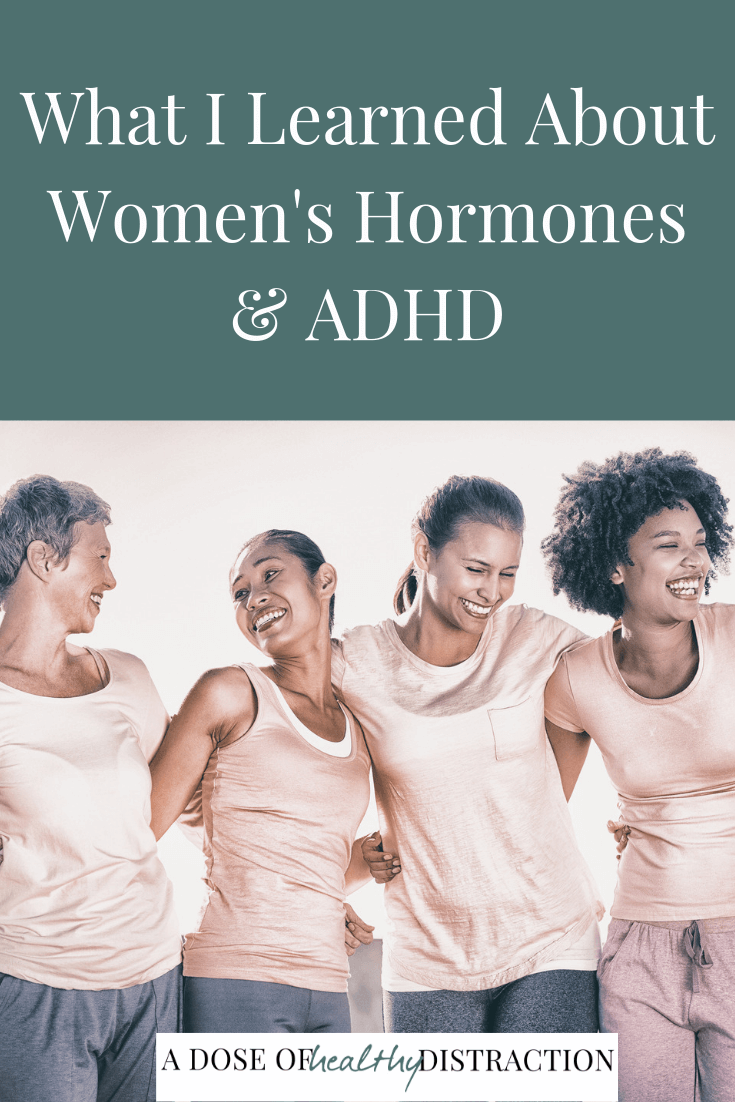
This is what I learned about women’s hormones and ADHD:
A woman’s hormones are as individual as the ADHD diagnosis itself.
Turning 40 is no joke. I should know, because I recently visited my obgyn where we discussed not only my impending mammogram, but also my fluctuating hormones.
You know what I mean. If you are over the age of 35, your hormones are probably fluctuating too.
Every month for two or three days before my period my Concerta is completely useless. And it’s annoying, which is why I listed my premenstrual symptoms for the very patient nurse practitioner.
-
Irritability
-
Mental confusion
-
Fatigue
-
Spotting between periods
-
Frequent periods
-
Heavier than normal periods
-
Increased PMS symptoms
The real story behind this article starts back in 2008-2009 when I was trying to get pregnant. I was told that my progesterone levels were low.
I thought my mood fluctuations after quitting birth control were due to the clomid I was taking to raise all of my hormone levels.
And then I gave birth and I felt more out of control than I ever had. More depressed, more overwhelmed. More…everything.
Have you ever gone off birth control pills? Or given birth?
If so, then you understand what it feels like when your estrogen declines really rapidly.
It feels like PMS, but waaaaay worse.
So it makes sense that the hormonal fluctuations that happen in our 30’s, and through perimenopause, and then finally menopause should affect our ADHD symptoms.
What I learned about women’s hormones
and ADHD
Since I am a compulsive researcher I started Googling things like “hormones and ADHD” or “estrogen and ADHD.”
Guess what?! I am not crazy. There is a connection between hormones and our ADHD symptoms.
PMS
How many of you feel like you deal with major mood swings before your period?
PMS mood swings are a well-documented phenomenon.
My emotions are much more raw as my estrogen drops before my period. PMS symptoms are multifactorial, and stress is an issue, but hormones are definitely part of the equation.
I have read that mid-level estrogen in the bloodstream is ideal for stimulant medications to work effectively.
This is why my Concerta feels like it isn’t working when I have PMS.
According to Jacqueline Sinfield of Untapped Brilliance, (Find her HERE) these mood swings are related not just to estrogen’s affects on dopamine, but also to the hormone progesterone. She writes:
“In the first 14 days of the menstrual cycle, everything is fine because estrogen is high and progesterone is low. However, the trouble starts in the second 14 days of your cycle when the estrogen is low and progesterone is high because when progesterone levels are high, dopamine levels drop.”
Dun dun dun….our dopamine levels drop even more before our period starts!
Good Ol’ Aunt Flo
I am going to talk frankly about periods here. If that offends you click away NOW.
Women begin to experience fluctuating levels of hormones during puberty before they begin menstruating. Estrogen levels are highest during the first half of the cycle, and then decline during the follicular phase.
Most women will suffer from some degree of hormone induced mood swings at some point in their lives.
Estrogen is not only responsible for mood swings, but has also been linked to memory and cognitive function. (Source)
The fact that my focus and productivity is worse during that time of the month should come as no surprise. Not that one should use hormones as an excuse…we just need to be aware of what exactly is going on inside our bodies.
Pregnancy and Childbirth
What was your mood like in the days/weeks after giving birth?
I was hormonal, in pain and caring for a high needs infant. So as you can imagine I suffered with some degree of postpartum depression.
If you have ADHD, you are already at much higher risk of depression and anxiety. So the hormonal fluctuations immediately after giving birth are going to impact your cognition and ADHD symptoms.
Dr. Patricia Quinn explains that during pregnancy many women report feeling great due to high levels of hormones. ADHD symptoms are under control and all is well. Many of these same women went on to describe how depressed and unfocused they felt after the birth of their child. SOURCE
Hormone levels drop precipitously after giving birth. This drop can lead to extreme mood swings. Couple that with lack of sleep and it is no wonder shiz gets real.
Perimenopause
While I don’t feel depressed, I have read that many women find themselves feeling blue during perimenopause and menopause. Dopamine and Serotonin play a major role in feelings of depression.
According to Patricia Quinn in this article, estrogen affects the release of both dopamine and serotonin. Those of us with ADHD are often low on dopamine in particular. This explains the increased feelings of sadness that happen during this time in many women’s lives.
Some women first start to notice ADHD symptoms while going through the “change.” Other women are misdiagnosed with depression and try SSRI’s or other medications before being properly diagnosed.
Here is another article authored by my friend Terry Matlen specifically about ADHD and menopause.
-
Educate yourself on the role of hormones at all stages of your life and how they interact with your ADHD symptoms.
-
Talk to your psychologist/psychiatrist openly about what is going on and where you are in your hormonal journey. Adjust medications as necessary.
-
Discuss hormones and ADHD with your gynecologist. If you need to, educate them.
-
Practice self care. Meditate, read, exercise, eat well and take care of you.
If you read this far you deserve a video! Here is a short one from one of my favorites, Sari Solden.
For more from Dr. Patricia Quinn here is are some Amazon Links:


